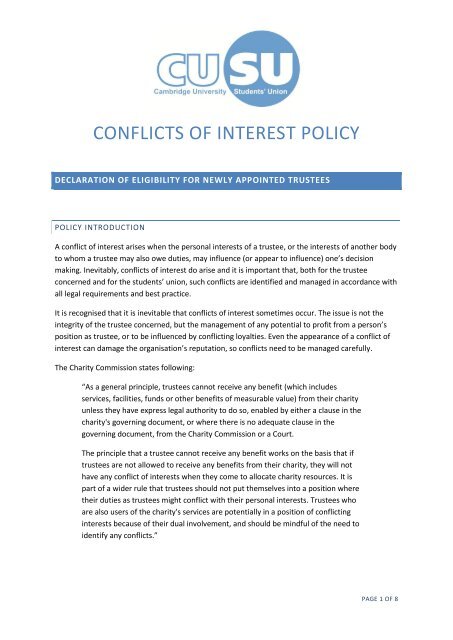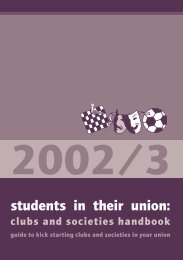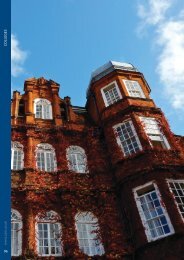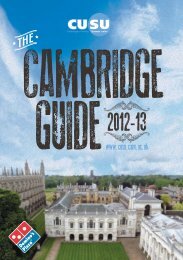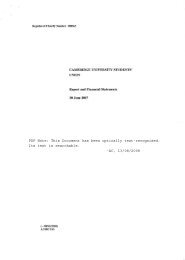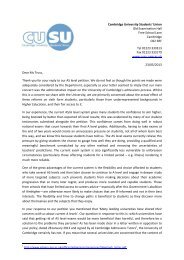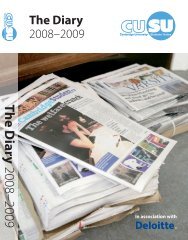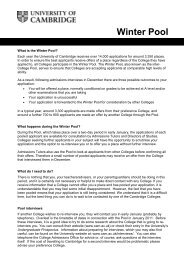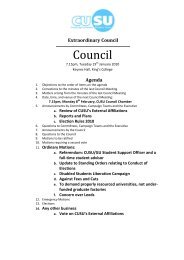conflicts of interest policy - Cambridge University Students' Union
conflicts of interest policy - Cambridge University Students' Union
conflicts of interest policy - Cambridge University Students' Union
Create successful ePaper yourself
Turn your PDF publications into a flip-book with our unique Google optimized e-Paper software.
It is the potential, rather than the actual, benefit from which the conflict <strong>of</strong> <strong>interest</strong> arises whichrequires authority. In order to avoid a breach <strong>of</strong> trust and to ensure transparency, authority isrequired where there is a possibility <strong>of</strong> benefit. This will avoid accusations <strong>of</strong> impropriety, whichcould in turn have a damaging effect on the reputation <strong>of</strong> <strong>Cambridge</strong> <strong>University</strong> Students’ <strong>Union</strong>(CUSU).Benefits that are available to all members <strong>of</strong> the community, or that are <strong>of</strong> inconsequential or <strong>of</strong>little measurable value will not normally need to be authorised; such is likely to be most relevant toSabbatical and Member trustees who will benefit from the services CUSU provides for itsmembership in general.POLICY STATEMENTTrustees should not be in a position where their personal <strong>interest</strong>s and their duty to act in the best<strong>interest</strong> <strong>of</strong> the charity conflict, except where a benefit to them, or others connected with them, islegally authorised and any conflict <strong>of</strong> <strong>interest</strong> is properly and openly managed.CUSU is committed to upholding an exemplary standard <strong>of</strong> governance by preventing, identifyingand acting upon corruption, fraud and irregularity. Trustees are expected to act with the higheststandards <strong>of</strong> integrity and probity in all dealings to do with CUSU. The trustees, CUSU Coordinatorand General Manager in particular are expected to lead by example in ensuring that the highestlevels <strong>of</strong> behaviour are adopted.Trustees must not use their <strong>of</strong>fice (or, in the case <strong>of</strong> Sabbatical Trustees, employment) for personalgain and should act at all times in good faith and in the <strong>interest</strong>s <strong>of</strong> CUSU. This Conflict <strong>of</strong> InterestPolicy is designed to assist trustees to identify, disclose and manage any real, perceived or potential<strong>conflicts</strong> <strong>of</strong> <strong>interest</strong> in the performance <strong>of</strong> their duties. This Policy ensures all trustees are aware <strong>of</strong>their obligations to disclose any <strong>conflicts</strong> <strong>of</strong> <strong>interest</strong> they may have, and to comply with the legalrequirements upon trustees <strong>of</strong> a charity.Breach <strong>of</strong> this <strong>policy</strong>, or failure to comply with the strategy for managing the conflict <strong>of</strong> <strong>interest</strong>, maylead to disciplinary action or other appropriate action against trustees by <strong>Union</strong> Council.FORMS OF CONFLICT OF INTERESTConflict <strong>of</strong> <strong>interest</strong>s involve direct financial gain or benefit to the trustee, such as:a) Payment for services provided to the charity;b) The award <strong>of</strong> a contract to another organisation in which the trustee has an <strong>interest</strong> andfrom which the person will receive a financial benefit.c) Positions <strong>of</strong> <strong>of</strong>fice held within another organisation.d) Shareholdings, investments or other business <strong>interest</strong>s held by the individual or a familymember.e) The employment <strong>of</strong> a trustee in a separate post within the charity, even when the trusteehas resigned in order to take up the employment.PAGE 2 OF 8
f) Indirect financial gain, such as employment by the charity <strong>of</strong> a spouse or partner <strong>of</strong> atrustee, where their finances are interdependent.g) Non-financial gain, such as when a user <strong>of</strong> the charity’s services is also a trustee.h) Conflict <strong>of</strong> loyalties, such as where a family member or friend <strong>of</strong> a trustee, is employed bythe charity or where a personal relationship exists between members <strong>of</strong> staff or between atrustee and a member <strong>of</strong> staff which could lead to a suspicion <strong>of</strong> favouritism or preferentialtreatment.AVOIDING CONFLICTS OF INTERESTTrustees have a duty to avoid a situation in which they have, or can have, a direct or indirect <strong>interest</strong>that <strong>conflicts</strong>, or possibly may conflict, with the <strong>interest</strong>s <strong>of</strong> CUSU, unless the matter has been dulyauthorised.Each trustee is individually responsible for disclosing any potential or actual <strong>conflicts</strong> <strong>of</strong> <strong>interest</strong> thatmay impact on their roles and responsibilities at CUSU. When deciding on such matters,consideration must also be given to how things could appear to others and, in all cases, individualsshould err on the side <strong>of</strong> caution, declaring an <strong>interest</strong> if there is any possibility that a conflict <strong>of</strong><strong>interest</strong> may exist. The General Manager will be available to <strong>of</strong>fer advice and information toindividuals about this Policy and whether an issue falls within the definition <strong>of</strong> a Conflict <strong>of</strong> Interest.All trustees need to be alert to possible <strong>conflicts</strong> <strong>of</strong> <strong>interest</strong> which they might have and to how theycan minimise their effects. A key aspect <strong>of</strong> minimising the effects <strong>of</strong> <strong>conflicts</strong> <strong>of</strong> <strong>interest</strong> is to be openand transparent about such situations when they arise:i) If trustees are in any way directly or indirectly <strong>interest</strong>ed in any transaction or arrangementrelated to CUSU, trustees are required to duly declare their <strong>interest</strong>.ii) Trustees may not accept gifts or favours, except when not to do so would damage therelationship with an external party. Any such gifts or favours should be declared to theGeneral Manager or the President.iii) Any excessive <strong>of</strong>fers <strong>of</strong> gifts, favours, bribes, etc. should be reported immediately to theGeneral Manager in order to ensure that no suggestion <strong>of</strong> impropriety could be made in thefuture and in order for the General Manager to decide whether any further action should betaken against the external party.iv) Where conflicting personal relationships exist, these should be declared in the same way asrelationships with external organisations.v) The Charity Commission expects trustees to be able to identify <strong>conflicts</strong> <strong>of</strong> <strong>interest</strong> whenthey arise and to ensure, if they receive a material benefit as a result <strong>of</strong> the conflict <strong>of</strong><strong>interest</strong>, that the benefit is authorised by the Commission. The Commission will provideauthority where there are clear advantages to the charity. If there is no material benefit to atrustee, no authority from the Charity Commission will be required, but the trustees will stillPAGE 3 OF 8
need to ensure that the conflict <strong>of</strong> <strong>interest</strong> is properly disclosed and managed (such shouldbe done in consultation with the General Manager and/or Chair <strong>of</strong> the Board <strong>of</strong> Trustees).vi) Declarations should be made using the standard form shown at Appendix 1 (CUSU TrusteeBoard Register <strong>of</strong> Interests Form). The General Manager will, having taken advice ifnecessary, advise whether the conflict or potential conflict requires authorisation by theCharity Commission, keep the individual trustee and the Board <strong>of</strong> Trustees informed aboutthe progress <strong>of</strong> the authorisation process, and confirm in due course whether CharityCommission authorisation has been received or not. A process will then be devised by theGeneral Manager, in consultation with the President, and followed by the trustee or Board<strong>of</strong> Trustees in relation to the conflict <strong>of</strong> <strong>interest</strong> as required by the Charity Commission.vii) A Register <strong>of</strong> Interests, detailing all declared <strong>conflicts</strong> <strong>of</strong> trustees, will be maintained by theGeneral Manager (or delegated to another member <strong>of</strong> staff).viii) A trustee must declare any conflict <strong>of</strong> <strong>interest</strong> which he or she has in an item to be discussedat the start <strong>of</strong> any Board <strong>of</strong> Trustees or other meetings, and certainly before any discussion<strong>of</strong> the item itself.ix) Simply declaring that a conflict exists and withdrawing from the meeting room, discussionand / or any decision making is all that is required if the trustee is not receiving any materialbenefit as a result <strong>of</strong> the conflict <strong>of</strong> <strong>interest</strong>. The trustee will not be entitled to vote on therelevant issue or issues. If a trustee is receiving a material benefit this will need authority,either from CUSU’s governing documentation or from the Charity Commission (as detailedabove). If authority derives from the constitution, full details <strong>of</strong> this authority must berecorded in the minutes before discussion <strong>of</strong> the relevant matter ensues. If the authorityderives from the Charity Commission, a copy <strong>of</strong> the written authority must be laid before themeeting and recorded in the minutes. Once authorisation exists, the trustee will be entitledto vote on the issue to which the conflict <strong>of</strong> <strong>interest</strong> relates, unless prohibited from doing soby the strategy for managing the conflict <strong>of</strong> <strong>interest</strong> approved within the Charity Commissionauthorisation.x) Due consideration should be given as to the extent to which a Sabbatical or Member Trusteemay benefit personally from decisions made concerning benefits to CUSU’s membership as awhole and such consideration should be openly declared, discussed and recorded at Boardmeetings.xi) If no authority derives from the Constitution or from the Charity Commission, includingcases where authority has been applied for to the Charity Commission but no decision yetreceived, the trustee or trustees having the conflict <strong>of</strong> <strong>interest</strong> must immediately withdrawfrom the meeting room and take no part in the discussion or decision-making on therelevant matters. The trustee will not be entitled to vote on the relevant issue or issues.PAGE 4 OF 8
TRUSTEE’S PERSONAL REGISTER OF INTERESTSI, as trustee <strong>of</strong> <strong>Cambridge</strong> <strong>University</strong> Students’ <strong>Union</strong> (CUSU), have set out below my <strong>interest</strong>s in accordance with CUSU’s Conflict <strong>of</strong> Interest Policy:PLEASE GIVE DETAILS OF THE INTEREST AND WHETHER IT APPLIES TO YOURSELF OR, WHERE APPROPRIATE, A MEMBER OF YOUR IMMEDIATEFAMILY, CONNECTED PERSONS OR SOME OTHER CLOSE PERSONAL CONNECTION.CURRENT EMPLOYMENT AND ANY PREVIOUSEMPLOYMENT IN WHICH YOU CONTINUE TO HAVE AFINANCIAL INTERESTAPPOINTMENTS (VOLUNTARY OR OTHERWISE), E.G.TRUSTEESHIPS, DIRECTORSHIPS, LOCAL AUTHORITYMEMBERSHIP, TRIBUNALS ETC.MEMBERSHIP OF ANY PROFESSIONAL BODIES,SPECIAL INTEREST GROUPS OR MUTUAL SUPPORTORGANISATIONS.INVESTMENTS IN UNLISTED COMPANIES,PARTNERSHIPS AND OTHER FORMS OF BUSINESS,MAJOR SHAREHOLDINGS (IN BRIEF ONLY).PAGE 6 OF 8
GIFTS OR HOSPITALITY OFFERED TO YOU BYEXTERNAL BODIES AND WHETHER THIS WASDECLINED OR ACCEPTED IN THE LAST TWELVEMONTHS.DO YOU USE, OR CARE FOR A USER OF THE CUSU’SSERVICES?ANY CONTRACTUAL RELATIONSHIP WITH CUSU.ANY OTHER CONFLICTS THAT ARE NOT COVERED BYTHE ABOVE.PAGE 7 OF 8
To the best <strong>of</strong> my knowledge, the above information is complete and correct. I undertake to updateas necessary the information provided, and to review the accuracy <strong>of</strong> the information on an annualbasis. I give my consent for it to be used for the purposes described in the Conflict <strong>of</strong> Interest Policyand for no other purpose.PRINT NAMESIGNEDDATEPAGE 8 OF 8


